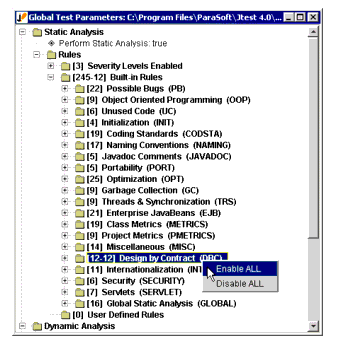Using Design by Contract With JtestBenefits of Using DbC With JtestYou do not need to use Design by Contract (DbC) in order to use Jtest. You can, however, increase Jtest's functionality if you use DbC; there are several main advantages to using DbC with Jtest:
Jtest and JcontractJtest contains all necessary elements to understand DbC comments and create test cases that check whether the specifications detailed in those comments are indeed implemented. It uses the DbC information to check that the unit in and of itself is implemented correctly. Jcontract is a new Java development tool that checks DbC contracts at runtime; it is run independently of Jtest, but the two tools are complementary. After you have used Jtest to thoroughly test a class or component at the unit level, instrument it with Jcontract, integrate it into your system/application, then Jcontract will automatically check whether its contracts are violated at runtime. Jcontract is particularly useful for determining whether an application misuses specific classes or components. Creating DbC CommentsSee for a general description of DbC, see About Design by Contract. See The Design by Contract Specification Language for information on how to add DbC comments to your code. Jtest's Design by Contract Static Analysis rules help you create well-formed DbC contracts. These rules are not enabled by default. To enable them, perform the following steps:
Using DbC Information in TestsJtest will use DbC information in its tests as long as the class under test's DbC contracts have been instrumented (by default, they are instrumented as the class is loaded). Just run the test in the normal manner, then Jtest reads specification information built into the class with the DbC language, and automatically develops test cases based on this specification. Jtest designs its black-box test cases as follows:
If Jtest finds inputs that violate preconditions, postconditions, class invariant conditions, and assert clauses, it will report them in the Design by Contract Violations branch of the Errors Found Panel (if you tested a single class) or the Results Panel (if you tested a project). Jtest also uses the DbC information to automatically suppress exceptions that are not relevant to the project at hand. If you document valid exceptions in the code using the @exception comment tag, Jtest will suppress any occurrence of that particular exception. If you use the @pre comment tag to document the permissible range for valid method inputs, Jtest will suppress errors found for inputs that fall outside of that range. Example FilesExample DbC files are contained in the <jtest_installation_dir>/examples/dynamic/dbc directory. Instrumentation OptionsIf you use DbC comments, Jtest will by default instrument the comments when it loads the class or project under test. You can control whether or not Jtest instruments DbC comments with the Automatically Instrument Design by Contract Comments option in all test parameters' Dynamic Analysis> Test Case Execution branch. Related TopicsThe Design by Contract Specification Language Testing A Class - Two Simple Examples Using Design by Contract With Jtest |

| (888) 305-0041 info@parasoft.com Copyright © 1996-2001 ParaSoft |
